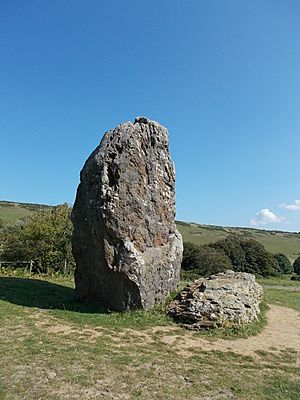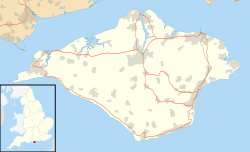The Longstone, Mottistone facts for kids

The Longstone at Mottistone
|
|
| Location | Mottistone, Isle of Wight |
|---|---|
| Coordinates | 50°39′22″N 1°25′31″W / 50.65621°N 1.42535°W |
| Type | Standing stone |
| History | |
| Periods | Neolithic |
The Longstone is a very old and large stone monument. It is found near the village of Mottistone on the Isle of Wight. This special monument is the only one of its kind on the island. It is a megalith, which means "large stone" in ancient Greek.
Contents
What is The Longstone?
The Longstone is made up of two pieces of local sandstone. This stone probably came from a rock vein about 100 meters (330 feet) away. The taller stone stands about 3.9 meters (13 feet) high. The smaller stone lies on the ground at its base.
Where can you find The Longstone?
You can find these stones at the edge of a small wood. They are in a fenced area just off Strawberry Lane, near Mottistone. The name Mottistone likely comes from The Longstone itself. It means "the Speaker's" or "pleader's stone."
The National Trust looks after the stones and the land around them. This means anyone can visit and see them.
Changes to the smaller stone
Until the mid-1800s, the smaller stone was in a different spot. In 1856, a local landowner named Lord Dillon had it moved. He wanted to see if it had a special hole for joining things. It did not have such a hole.
Because of its current position, some people have made up stories about it. These stories include ideas that it was used as a special altar.
The Longstone's ancient burial mound
The stones are connected to a narrow mound of earth. This mound is about 21 meters (69 feet) long and stretches west from the stones. In 1956, archaeologists dug here to learn more. Their work showed that this mound was likely the remains of a long barrow. A long barrow is a very old burial mound.
This suggests that the stones might have been the entrance to this ancient burial place. Long barrows like this are rare in this part of England, especially those not built on chalk or limestone.
How old is The Longstone?
It can be hard to figure out the exact age of such old monuments. However, pottery found during the 1956 digs helps us. This pottery shows that the mound, and probably the stones too, are from the Neolithic period. This means they are from the New Stone Age, a very long time ago!
 | May Edward Chinn |
 | Rebecca Cole |
 | Alexa Canady |
 | Dorothy Lavinia Brown |


